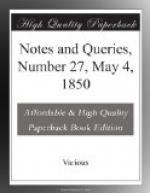“In those rude times when wealth or movable property consisted almost entirely of living money, in which debts were contracted and paid, and for which land was given in mortgage or sold; it is quite certain that the serfs were transferred with the land, the lord considering them as so much live-stock, or part of his chattels.”
A vestige of this feeling with regard to dependants remains in the use of the word Man (which formerly had the same sense as lede). We still speak of “a general and his men,” and use the expression “our men.” But, happily for the masses of mankind, few vestiges of serfdom and slavery, and those in a mitigated form, now virtually exist.
S.W. SINGER.
April 16. 1850.
[Footnote 1: It occurs many times in the Moeso-Gothic version of the Gospels for [Greek: ptochos]. From the Glossaries, it appears that iungalauths is used three times for [Greek: neaniskos], a young man; therefore lauths or lauds would signify simply man; and the plural, laudeis, would be people. See this established by the analogy of vairths, or O.H.G. virahi, also signifying people. Grimm’s Deutsche Gram. iii. 472., note. “Es konnte zwar unleds (pauper) aber auch unleths heissen.”—D. Gr. 225.]
[Footnote 2: Sir F. Palgrave has given this extract in the Appendix to his Rise and Progress of the English Commonwealth, p. ccccvii., where, by an error of the press, or of transcription, the word stands lich. It may be as well to remark, that the corresponding word in Latin formulas of the same kind is “catallis,” i.e. chattels. A passage in Havelok, v. 2515., will clearly demonstrate that lith was at least one kind of chattel, and equivalent to fe (fee).
“Thanne
he was ded that Sathanas
Sket
was seysed al that his was,
In the King’s
hand il del,
Lond
and lith, and other catel,
And the King ful
sone it yaf
Ubbe in the hond
with a fayr staf,
And seyde, ’Her
ich sayse the
In al the lond
in al the fe.’”]
[Footnote 3: The author of Tripartita seu de Analogia Linguacum, under the words “Leute” and “Barn,” says:—“Respice Ebr. Id. Ebr. ledah, partus, proles est. Ebr. lad, led, gigno.” A remarkable coincidence at least with Grimm’s derivation of leod from the Goth. liudan, crescere.]
[Footnote 4: Thus, Anthon, Teutschen Landwirthschaft, Th. i. p. 61.:—“Das Land eines jeden Dorfes, einer jeden Germarkung war wirklich getheilt und, wie es sehr wahrscheinlich, alsdan verlost worden. Daher nannte man dasjenige, was zu einem Grunstueke an Aekern, Wiesen gehoerte, ein Los (Sors). Das Burgundische Gesetz redet ausfdruecklich vom Lande das man in Lose erhalten hat (Terra sortis titulo acquisita,




